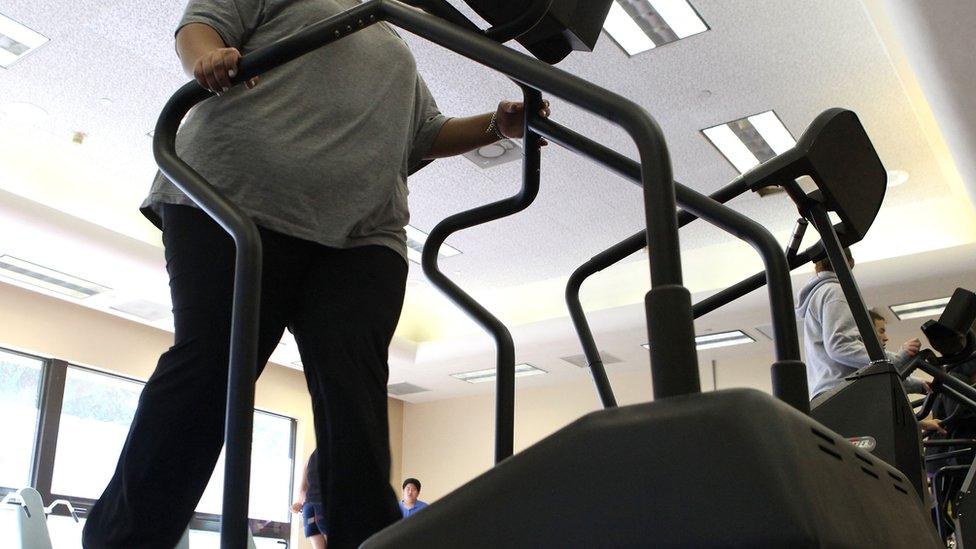Are surgery weight restrictions on the rise?
- Published

Most overweight patients in England face being denied surgery, even when this goes against national guidelines on clinical best practice.
The Reality Check team asked the 213 local clinical commissioning groups (CCGs), responsible for planning and buying healthcare services, in England whether they limited funding for surgery on the basis of body mass index (BMI).
We asked which procedures this applied to and what the BMI limit was.
BMI is calculated, external by dividing an individual's weight by their height squared, to place them in a category from underweight through to morbidly obese.
Of the 170 CCGs' policies we analysed, 133 - 62% of all CCGs - said they were using patients' BMI to limit which surgeries they would fund.
Treatments being restricted include:
hip and knee replacements
breast reduction
varicose vein surgery
other plastic surgery including removal of excess skin
The National Institute for Clinical Excellence (NICE), which sets guidelines for the health service, explicitly says factors such as obesity and smoking "should not be barriers to referral" when it comes to joint surgery.
And for plastic surgery, while there are studies showing higher rates of complications for patients with both very high and low BMIs, NICE does not set specific guidelines.
The British Association of Plastic, Reconstructive and Aesthetic Surgeons (BAPRAS) says CCGs have most often "selected an arbitrary figure".
An NHS England official said: "For many medical conditions, treatment is safer and more likely to work if you've first got to a healthier weight.
"However, ultimately these are legally decisions for local GP groups to take, and they have to decide the best way of spending the budget Parliament has allocated the NHS."

The Royal College of Surgeons is concerned patients are being left in pain
Blanket bans
But the Royal College of Surgeons is concerned that patients are being left in pain and distress unnecessarily.
"It's the blanket nature of the restrictions that is the most worrying," the college's vice-president, Ian Eardley, says.
"No doctor would say it's not a good idea for someone who's overweight to lose some of that excess weight, but it should be an individual assessment."
In 2016, the college produced a report that found half of CCGs had a policy restricting surgery based on BMI, with that restriction being mandatory in a third. Our research suggests that has now risen.
Earlier in the year, consultant plastic surgeon Nick Collis told the BBC that CCGs lowering their BMI thresholds, for example from 30 to 27, was evidence of cost-saving since this would pose "no real difference in operative risks and outcomes".
Allow Facebook content?
This article contains content provided by Facebook. We ask for your permission before anything is loaded, as they may be using cookies and other technologies. You may want to read Meta’s Facebook cookie policy, external and privacy policy, external before accepting. To view this content choose ‘accept and continue’.
Cost-saving
And the Patients' Association, a charity representing the concerns of people using health and care services, says it is worried by the increase in CCGs using BMI as a pretext for restricting treatment.
"Any decision to withhold a treatment should be assessed on an individual basis and be in the best interests of the patient.
"However, CCGs are increasingly frank that it is all about cost. In a wealthy nation, cost is no justification for a patient not receiving the healthcare they need, and particularly not relatively simple procedures which are known to be effective," the charity says.

Amy's story (name has been changed)
I had wanted a breast reduction for years and years. It originally started when I went on the pill and my breasts grew out of proportion with my size.
When I went to the doctor, they said I was a good candidate for the operation but first I would have to lose weight since I was above the normal range.
They told me to exercise. But I couldn't even buy a bra that would fit me to work out in so I didn't have any way of exercising. Eventually I just couldn't put up with it anymore.
When I went privately, the surgeon said I was completely fit for the operation. There was no medical reason I shouldn't have had it.
Four months on and the difference to my life is crazy - before the surgery there was no way I could work out, and yesterday I ran 5km [three miles].

Legal challenge
Although local health services are not required by law to follow the NICE guidance, if they can't provide an adequate reason for deviating from it they could be left open to legal challenge.
While BMI is commonly used in the NHS, it is acknowledged to be an imperfect measure that doesn't allow for different people's body compositions or ethnic differences.
It can provide a helpful guide, but it means just two or three extra pounds in weight can tip someone over into the next category.

Many surgeries dubbed "cosmetic" have medical causes
'Blunt instrument'
This becomes a problem if BMI is being used as a strict cut-off point for surgery, according to Mr Eardley.
The measure is a "blunt instrument", says consultant plastic surgeon Chris Hill.
He says many of the surgeries being restricted, including breast reductions and the removal of excess skin following massive weight loss, get branded as cosmetic despite addressing medical problems including back pain and infection.
"Clearly this is not about safety in surgery - this is about rationing," he says, pointing to the wide variation in policies around the country.
A separate piece of research by the BAPRAS last year found 12 CCGs were using BMI limits to restrict reconstructive surgery, including procedures for cancer survivors.
In four areas of England - Eastern Cheshire, Herts Valleys, the Vale of York and North East Essex - patients needing all types of non-urgent surgery could face having their procedure delayed if their BMI is too high.
Those CCGs say these policies are in place to reduce risk and improve patients' outcomes.



- Published22 April 2016
